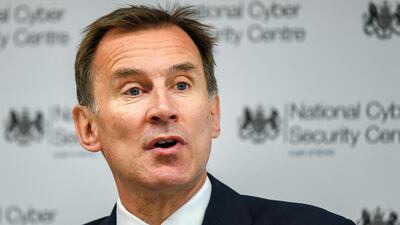Britain’s foreign secretary Jeremy Hunt has warned that Russia is operating a global cyber campaign to attack Western government computer systems and said allies must do more to counter this type of malicious state-directed cyber activity.
Speaking to a Nato audience invited by the UK’s National Cyber Security Centre (NCSC) in London on Thursday, Jeremy Hunt said: “Together, Nato countries have become better at defending themselves against dangers in cyber space.”
He added that the Nato alliance “should not be content with just making ourselves tougher targets – crucial though that is. Our primary goal must be to deter this kind of behaviour from happening in the first place,”
In a speech to the Nato Cyber Defence Pledge Conference, he hailed the alliance for its “collective power of deterrence”, which has prevented nuclear war and helped to keep the peace for 70 years.
“The challenge today is therefore to apply the eternal verities at the heart of Nato’s success to the Alliance’s newest operational domain. And that means deterrence - strengthening our joint ability to deter those who would harm our citizens in cyberspace.”
In the first two years of its existence, the NCSC dealt with over 1,000 cases of malicious cyber activity in the UK – equivalent to about 10 incidents every week.
One of the major cases it addressed was in 2017, when hackers in North Korea infected thousands of computers with the Wannacry ransomware, inflicting damage across the world.
That same year, in France, several Renault factories were brought to a halt and in Britain, 48 NHS hospitals were infected, when Mr Hunt was Health Secretary.
The foreign secretary then pointed the finger at Russia, saying that its intelligence services were targeting critical national infrastructure of many countries in order to look for vulnerabilities. He referred to Russian efforts to meddle in the elections of Ukraine and the United States.
He added: “This global campaign also seeks to compromise central government networks.”
“I can disclose that in the last 18 months, the National Cyber Security Centre has shared information and assessments with 16 Nato Allies – and even more nations outside the Alliance - of Russian cyber activity in their countries,” he added.
At the Warsaw Summit in 2016, Nato agreed to strengthen its national cyber defences, and agreed that there should be an annual Cyber Defence Pledge Conference to facilitate sharing of experience and best practice.
The London conference is the second such event, with France holding the first in 2018.
On May 13, Mr Hunt called for a dramatic increase in defence spending in a speech that appeared to be a thinly-veiled Tory leadership bid.
During a speech at London’s Mansion House, he warned of an “increasingly aggressive Russia” and “a more assertive China”.
The UK’s current defence budget is about £36 billion (Dh171.28bn) and has been relatively stable over the past five years.

